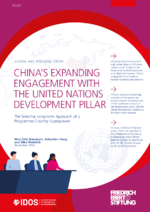
China's expanding engagement with the United Nations development pillar: the selective long-term approach of a programme country superpower
Baumann, Max-Otto / Sebastian Haug/ Silke WeinlichExternal Publications (2022)
Bonn: Friedrich Ebert Stiftung / German Institute of Development and Sustainability (IDOS), November 2022
ISBN: 978-3-98628-216-5
Volltext/Full text
The People’s Republic of China’s expanding influence in the United Nations (UN) has become a defining feature of today’s world politics. This study provides insights into China’s expanding role in the UN development pillar. We find that China has become an increasingly visible player over the last two decades as its funding for, staff representation in and diplomatic engagement with UN development work have expanded. Relative to the financial and political resources at its disposal, however, China’s engagement has largely remained moderate and selective. The thematic priorities and selected arenas China has focused on include rural development, big data and South-South and triangular cooperation. Overall, China appears to be taking an increasingly assertive and long-term approach towards changing some of the traditional contours of UN development work. Attempts to enshrine Chinese concepts in UN resolutions and the Global Development Initiative, for instance, seem to be directed at building the foundation for development multilateralism with Chinese characteristics. By doing so, China can make use of an asset that Western member states do not have at their disposal: the combination of its roles as a superpower and a UN programme country. China has capitalised on this duality to expand ties with the UN, notably through South-South cooperation support schemes. While many Western powers approach UN development organisations as project implementers, China has UN entities act as brokers or facilitators for processes and initiatives that are more immediately relevant to Chinese interests. The study provides reflections on the implications of these findings and concludes with recommendations for addressing (contestations around) China’s expanding engagement with the UN development pillar.



